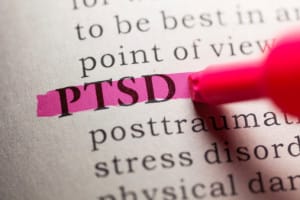The treatment of post-traumatic stress disorder (PTSD) can be challenging, given its varied symptoms and that it can appear in combination with other disorders, such as anxiety or depression. Common symptoms appearing with PTSD can include flashbacks, insomnia, difficulty focusing and other symptoms commonly associated with anxiety or depression. A recent study showed that cognitive behavior therapy (CBT) alleviated the symptoms of PTSD by mitigating the biological disturbances that occur in the brain following a traumatic event. The study, which appeared in Biological Psychiatry, was produced by researchers at the University of Szegen in Hungary. Led by Dr. Szabolcs Kéri, the researchers examined 39 individuals diagnosed with PTSD and noted biological changes exhibited following involvement in CBT. CBT is a type of talk therapy that teaches patients how to form new, more balanced beliefs about their situations, experiences or circumstances. The beliefs are used to develop new tools in order to practice healthy behaviors. It’s a type of therapy that has been proven effective in many types of mental disorders, including substance use disorders and eating disorders, and can be more cost-effective than many other types of treatments. The researchers compared the results of the 39 PTSD patients with those of 31 participants that had experienced a trauma but did not meet criteria for a diagnosis of PTSD. The PTSD patients participated in 12 weeks of CBT while the non-PTSD individuals received no therapy. Magnetic resonance imaging (MRI) was used at the beginning of the study to document the volumes of various brain regions. In addition, blood samples were collected in order to assess the expression of gene FKBP5, which has been identified as a risk factor for developing PTSD and is involved with stress regulation. When compared with the control group at baseline, the PTSD patients had lower FKBP5 gene expression and smaller hippocampal and medial orbitofrontal cortex volume measurements. These areas of the brain are involved with learning, emotions and memory. When the patients were examined again 12 weeks later using MRI the patients with PTSD had a higher measurement of FKBP5 and showed a higher volume in the hippocampal region of the brain. In addition, the measured biological changes occurred in conjunction with symptom improvement. In fact, the increased levels of FKBP5 and the increased hippocampal volume were predictors of symptom improvement. The findings indicate that the changes in the brain that occur as a result of PTSD are reversible with treatment. Talk therapy, such as that used in CBT, may help return the brain to more normal measurements and help improve the symptoms of patients with PTSD. CBT can provide treatment that is low-cost and does not come with the side effects experienced with medications. The findings suggest a connection between talk therapy and the modulation of fundamental biological functions. The changes demonstrated in gene expression, brain measurements and mental health improvement could be related. The findings also highlight the importance of early diagnosis and intervention in PTSD cases. Introducing talk therapy as soon as symptoms are identified and PTSD is diagnosed could help patients prevent the brain volume changes that can result in more severe symptoms. Further research may include examination of CBT as a preventative measure against the development of PTSD in patients who have undergone a trauma. Its low-cost nature may make it an effective prevention tool that allows patients to be identified for additional therapy needs.



